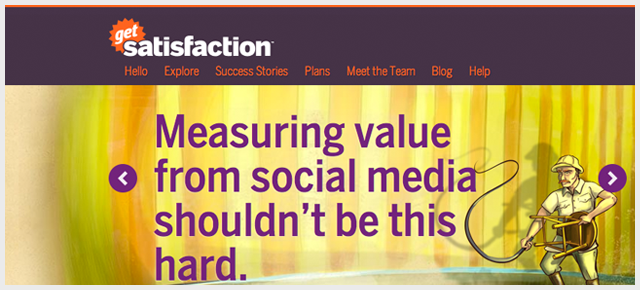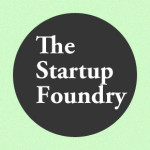Welcome to The Startup Foundry.
Get Satisfaction tells TSF why their commitment is to “be a good citizen”
Guest Author
TSFPublished: Feb 24, 2011 9:17 pm

Thor Muller is one of the original co-founders of Get Satisfaction and is also the current CTO. Get Satisfaction officially launched in September of 2007 and since then has grown to 50,000 communities, 6 million visitors a month and over 2,000 paying customers.
I had the chance to speak with Thor on the phone and we had a great conversation regarding how t hey started, challenges on the way, and their commitment to “Be a good citizen”.
Get Satisfaction is used by every size and category of company. It ranges from small mom and pop retail shops to Global 500 customers such as Walmart, P&G, Microsoft & Motorola. The appeal is broad.
My wife, Amy Muller, and I were founders of a consulting company we founded called Rubyred Labs. We had grown to a team of seven, working together on developing new social networks and web apps. Through a side-project called ValleySchwag we stumbled onto the intractable problem of customer service, which we thought could be reinvented using the social web. Lane Becker, a friend who had co-founded Adaptive Path, told us: “If you two don’t start it, I will”. We brought him on board as a co-founder and started Get Satisfaction.
During our initial pitches to investors we were told that most companies would never allow their “dirty laundry” to be aired in public. Customer service issues were “best kept hidden,” according to them. But our story was that companies don’t really have the choice: through blogs, Get Satisfaction, Twitter, Facebook, etc, people are able to summon companies into public conversation. This disruptive position was what ultimately attracted our initial investors, First Round Capital, OATV, and SoftTech VC, to us.
To be clear: we never set out to be a complaint site. Our goal was to create open spaces for people to connect with each other around the products and services they cared about. Being a “good citizen” has been central to playing this role. Instead of just providing a SaaS community platform we allowed anyone to start a customer community–be they an employee or a customer. This led to an initial launch of our service that was fundamentally consumer-driven.
Did this unconventional approach cause you any problems?
The good folks at 37signals had an issue with it, the result of a hasty update to our site design. We responded quickly to the issue (and it was a valid issue), and fixed our mistakes. I am the first to admit that it was our mistake. We received some feedback from outsiders to push back hard against the critique, but we felt that missed the point. This was our opportunity to live by our creed of conducting business with more humility, more humanity. Our original idea for a lightweight web app was inspired by 37signals’ work, and we genuinely respect the work that they have done.
Besides the 37 signals issue, were there any other public issues that you had to deal with? We’ve been fortunate to avoid many public mis-steps. One near miss: a year ago we pre-announced a change to our paid plans, including the removal of features from our free plan. However, we did not “grandfather” existing users. Not surprisingly, free users were upset. But since we were able to collect feedback before the actual change, we were able to add a grandfathering policy for our early users. We avoided a black eye by being ultra-responsive.
Are you bootstrapped or funded?
In our early months were able to use our existing cash flow from the consulting business, along with funding from our friends and family who were eager–perhaps recklessly so–to support the venture. Since we spun the business out of our development consultancy, we had a whole product team from day one.
How did you market your startup initially. What advice do you have for other early stage startups?
First and foremost, you need a good story. Early on, we had a provocative position: “Your company doesn’t own its customer service.” That statement resonated with a lot of people and that’s how we were able to get press. We also did a lot of speaking engagements, conferences, etc.
Another big thing that helped is that a few times we were featured as part of hot news stories or controversies. A prime example of this was last November, when DecorMyEyes was accused of cultivating complaints and bad reviews to gin up the SEO of their e-commerce site. The story got a lot of attention & press. We responded to the story, clarifying numerous mis-conceptions and providing technical guidance on how other sites could avoid being gamed by bad actors. This was an example of how we look for opportunities to be a good citizen. This is the social capital that the reputations and businesses are built on today.
Check Get Satisfaction out at http://www.getsatisfaction.com, or follow them on twitter @getsatisfactio. Follow the author on twitter @robbieab, and for up to the minute startup news – follow us on twitter @startupfoundry
-
👉 Filed Under.
Categorised in: Funded
Get Connected:
If you like startups, join our weekly mailing list. Good startup content, no fluff.
👇

Hi, I'm Paul Hontz.
I'm a YC alumn and I love startups. I created TSF to highlight companies I find interesting. You can learn more about me here.
Recent Posts:

The Story of Cruise (YC W14): How 4 people built a self driving car in 7 months.
Jul 8, 2014 2:35 pm

I Want To Write About Your Startup – Relaunching TSF
Jan 17, 2014 5:14 pm

How To Do B2B Email Sales
Nov 23, 2011 2:12 pm

Nasty Bug in iOS 5.0.1 OTA Update screws up Address Book on the iPhone 4S
Nov 10, 2011 11:56 pm

It’s Easier to Answer to Your Code Than Your Customers
Oct 28, 2011 2:25 pm


